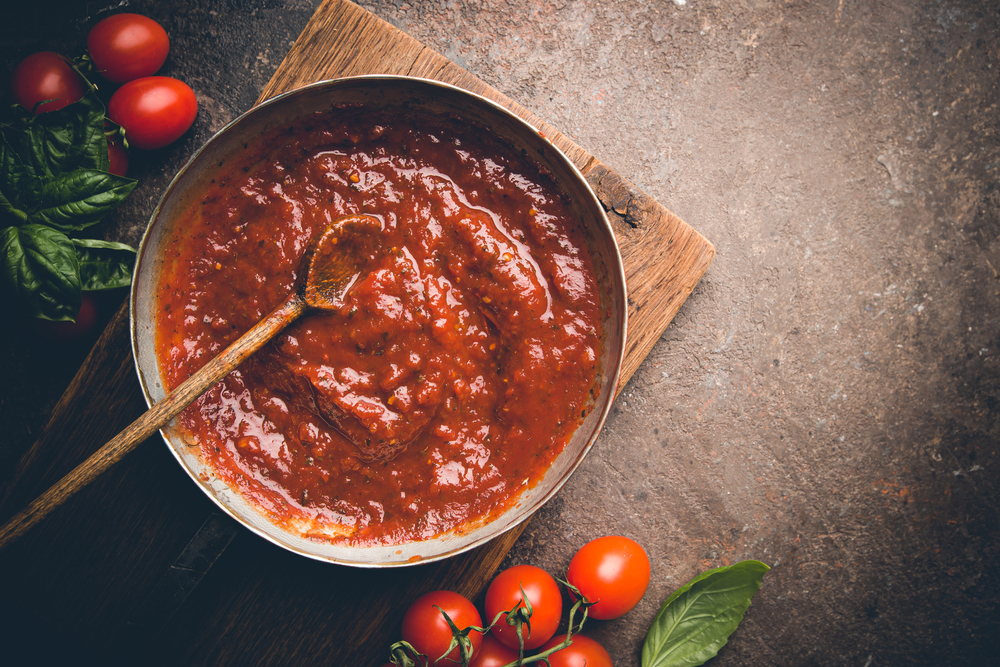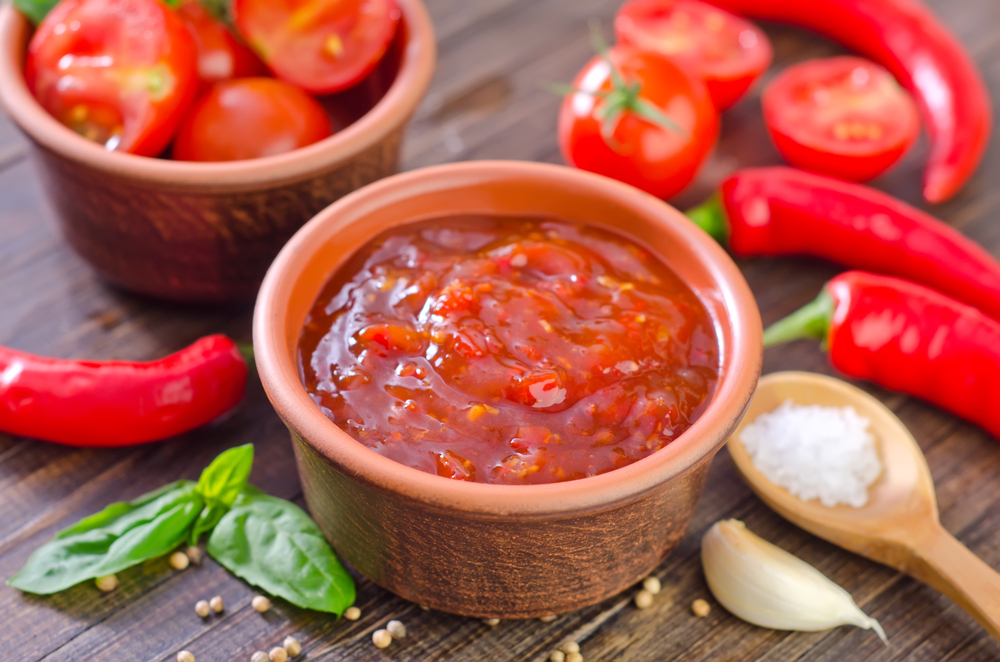The sauce is an important ingredient for cooking pizza. It gives the food its basic flavor and acts as a binder for the toppings. But what if you’re missing the pizza sauce? Can you substitute pasta sauce?

Yes, you can use pasta sauce on pizza, to give you the quick answer. In fact, a lot of people regularly engage in it. You should be aware that there are some distinctions between pizza sauce and pasta sauce.
For instance, compared to pizza sauce, which is thicker and more concentrated, pasta sauce is typically thinner and more liquid.
This may have an impact on the overall consistency and texture of your pizza. Moreover, depending on the components used, pasta sauce may have a slightly different flavor profile than pizza sauce.
Can You Use Pasta Sauce for Pizza?
As pizza lovers, we all know that the sauce is a crucial component of any great pizza. But what if you find yourself without a jar of pizza sauce in the pantry? Can you use pasta sauce instead?

The short answer is yes, you can use pasta sauce for pizza. However, there are a few things to keep in mind. First, pasta sauce is typically thinner than pizza sauce, which can lead to a soggy crust.
To avoid this, you may want to thicken your pasta sauce by adding tomato paste or simmering it on the stove to reduce the liquid.
Another consideration is flavor. While pasta sauce can work in a pinch, it may not have the same depth of flavor as pizza sauce.
Pizza sauce often includes additional spices and seasonings, such as oregano, basil, and garlic, to give it that signature pizza taste. If you’re using pasta sauce, you may want to add some of these seasonings to enhance the flavor.
Finally, it’s worth noting that not all pasta sauces are created equal. Some pasta sauces may contain ingredients that don’t work well on pizza, such as chunks of vegetables or bits of meat.
If you’re using a pasta sauce, look for one that is smooth and free of large chunks.
In summary, while it’s possible to use pasta sauce for pizza, there are some things to keep in mind. To avoid a soggy crust, consider thickening your sauce, and be sure to add additional seasonings to enhance the flavor.
And remember, not all pasta sauces are created equal, so choose one that will work well on your pizza.
Differences Between Pasta Sauce and Pizza Sauce
When it comes to pasta sauce and pizza sauce, there are some key differences in texture, flavor, and consistency. Let’s take a closer look at each of these factors.

Texture
One of the main differences between pasta sauce and pizza sauce is the texture. Pizza sauce is typically thicker in consistency, with a more concentrated tomato flavor.
This is because pizza sauce is often made with tomato paste, which has a thicker consistency than tomato sauce. On the other hand, pasta sauce is usually thinner in consistency, with a more diluted tomato flavor.
Flavor
Another key difference between pasta sauce and pizza sauce is the flavor. Pizza sauce tends to be more savory and robust, with a tangy flavor that complements the other toppings on the pizza.
Pasta sauce, on the other hand, is often sweeter and more mild in flavor, which pairs well with the pasta.
Consistency
The consistency of the sauce is also an important factor to consider. Pizza sauce is thicker in consistency, which helps it to stick to the crust and prevent it from becoming soggy.
Pasta sauce, on the other hand, is thinner in consistency, which allows it to coat the pasta more evenly.
While there are some similarities between pasta sauce and pizza sauce, there are also some key differences in texture, flavor, and consistency.
When it comes to using pasta sauce on pizza, it may work in a pinch, but the end result may not be as flavorful or satisfying as using a true pizza sauce.
Ingredients in Pasta Sauce and Pizza Sauce
When it comes to pasta sauce and pizza sauce, the ingredients used are quite similar. Both sauces typically contain tomatoes, garlic, onion, spices, sugar, and pepper.

However, the difference lies in how these ingredients are prepared and used in each sauce.
Tomatoes
Tomatoes are the base ingredient for both pasta sauce and pizza sauce. However, the type of tomatoes used can vary.
For pasta sauce, canned crushed or diced tomatoes are often used. On the other hand, pizza sauce is usually made with pureed canned tomatoes or tomato paste.
Garlic and Onion
Garlic and onion are both commonly used in pasta and pizza sauces. In pasta sauce, they are often sautéed in olive oil before being added to the tomato base. In pizza sauce, they are usually added in the form of garlic and onion powder.
Spices
Spices are a crucial component of both pasta and pizza sauces. Italian seasoning, dried oregano, and dried basil are commonly used in both sauces. However, pizza sauce may also include red pepper flakes for added spice.
Sugar
Sugar is often added to both pasta and pizza sauces to balance out the acidity of the tomatoes. However, the amount of sugar used may vary depending on personal preference and the type of tomatoes used.
Pepper
Pepper is another common ingredient in both pasta and pizza sauce. Black pepper is typically used in both sauces, but pizza sauce may also include garlic salt for added flavor.
In summary, while there are some differences in the preparation and use of ingredients, pasta sauce, and pizza sauce share many similarities.
Both sauces typically contain tomatoes, garlic, onion, spices, sugar, and pepper, and can be easily customized to suit personal tastes.
Using Pasta Sauce on Pizza
When it comes to making pizza, there are many different types of sauces you can use as a base. One option is to use pasta sauce, but there are a few things to keep in mind to ensure that it works well on your pizza.

Cooking Pasta Sauce for Pizza
When using pasta sauce on pizza, it’s important to cook it first. This will help to thicken the sauce and ensure that it spreads evenly on the pizza crust. To cook pasta sauce for pizza, simply simmer it on the stove for a few minutes until it reaches the desired consistency.
Thinning Pasta Sauce for Pizza
If your pasta sauce is too thick to use on pizza, you can thin it out by adding a little bit of water or pasta cooking water. This will help to make the sauce more spreadable and ensure that it doesn’t overwhelm the other flavors on the pizza.
Adding Flavor to Pasta Sauce for Pizza
To add some extra flavor to your pasta sauce for pizza, you can try adding herbs like basil or oregano, as well as some olive oil or garlic powder. You can also experiment with different types of pasta sauces, like marinara or pesto, to see what works best for your pizza.
When it comes to toppings, pasta sauce pairs well with a variety of flavors, including ground beef, Italian sausage, peppers, and tomato chunks. You can also blend the sauce with an immersion blender or food processor to create a smoother texture.
Using pasta sauce on pizza is a great way to switch things up and experiment with different flavors. Whether you’re making homemade pizza or ordering from a pizzeria, there are plenty of ways to make your pizza unique and delicious.
Conclusion
After researching and analyzing the differences between pasta sauce and pizza sauce, we have come to the conclusion that while it is possible to use pasta sauce on pizza, it may not be the best option.
Pasta sauce typically has a higher water content, which gives it a thinner consistency compared to pizza sauce.
This thinner consistency can make the sauce spread more easily over the surface of noodles, but it may not be ideal for pizza.
Pizza sauce is made with pureed tomatoes, which makes it thicker and more suitable for adding a layer of flavor between the crust and toppings.
However, if you prefer a sweeter flavor profile, you may find that pasta sauce works better for your taste buds. In this case, you can make a few adjustments to the sauce to make it more suitable for pizza.
For example, you can add a little bit of sugar to the pasta sauce to make it sweeter, or you can reduce the water content by simmering the sauce for a longer period of time.
The choice between pasta sauce and pizza sauce comes down to personal preference. While pizza sauce is the traditional choice for making pizza, there is no harm in experimenting with different types of sauces to find the one that suits your taste buds the best.







Add comment